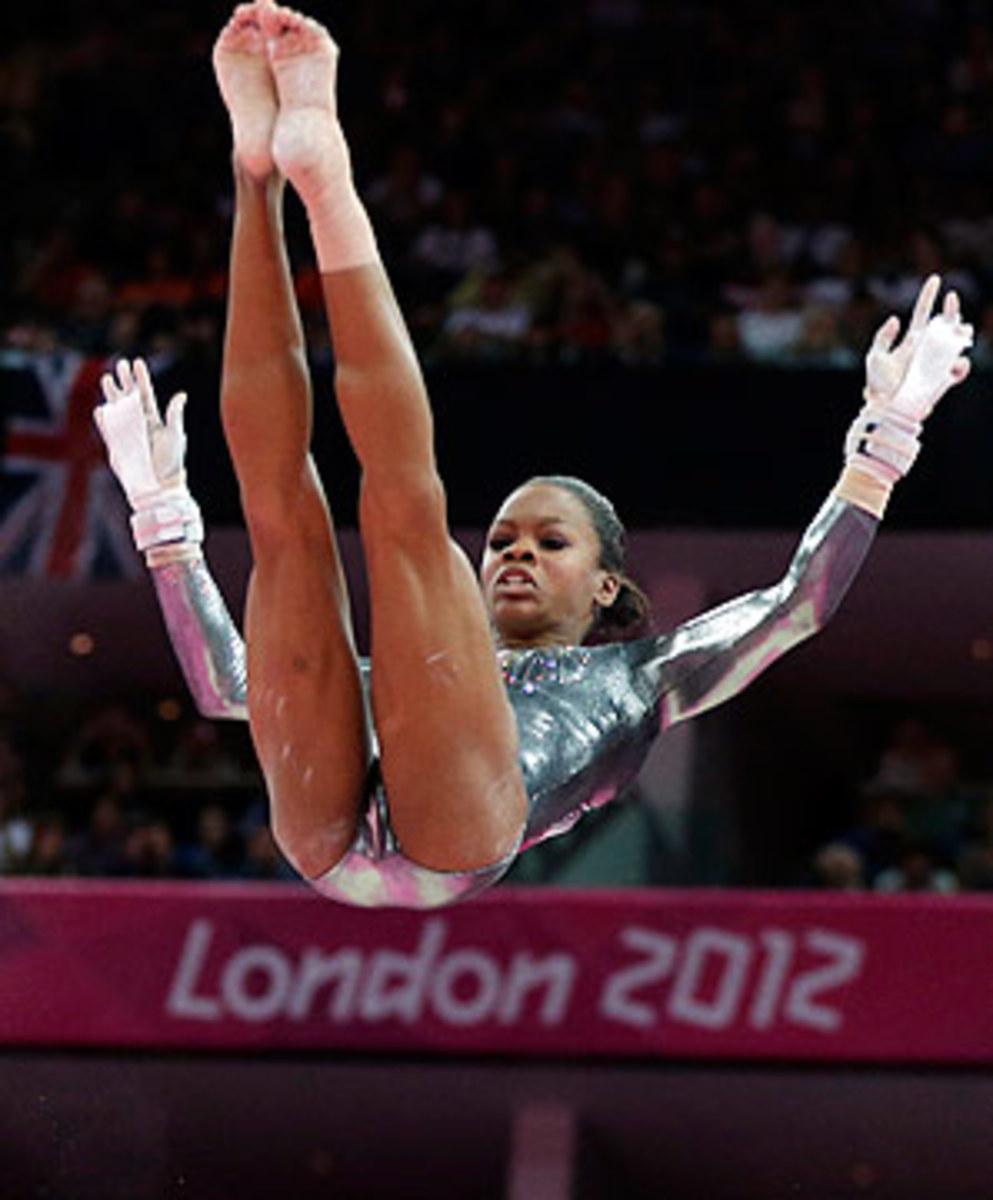
Douglas proves human on uneven bars; more notes from the gym
"I wanted to finish as strong as I could," said Douglas, the all-around champion. "I wasn't my best and the other girls were amazing."
With a score of 14.900, the 16-year-old American finished behind gold medalist Aliya Mustafina of Russia (16.133), silver medalist He Kexin of China (15.933) and bronze medalist Beth Tweddle of Great Britain (15.916).
Douglas didn't make a glaring mistake. Essentially, she went over in the wrong direction on one of her handstands and improvised in order to cover it up. It's the nature of event finals that gymnasts often take more chances and receive a wider range of scores than in team or qualifying events. A risk that might add an extra tenth or two isn't worth the gamble when it might affect a cumulative score, but in event finals, when only one routine determines the medalists, gymnasts are more willing to include risky elements. Some hit; others miss. This was a rare day when it seemed everyone hit. There were no falls on the apparatus among any of the eight competitors and the lowest execution score of the meet was a high 8.566.
[Phil Taylor: Life-changing all-around victory for Douglas]
"I did an inside full and I should have pulled harder," Douglas said. "I tried to cover up with a pirouette and just keep going as best I could."
Douglas' difficulty level or start value (6.300 with the error) wasn't as high as others. The three medalists each had start values at 7.0 or higher. Still, Douglas' mistake (and final score) have an interesting timeline.
In the team competition, she received a mark of 15.200 for what looked like a mistake-free routine, one that could have scored much higher. But on closer inspection, Douglas stopped short of vertical on two of her handstands, the kind of glitch that doesn't always get hit as hard in domestic meets. International judges scrutinize harder.
In the all-around final, Douglas pushed the handstands as close to their straight-as-a-pencil position as possible. It's a risk, but she pulled the swing through just as she had planned and was rewarded for it with 15.733. The transition element is not nearly as noticeable as her sky-high release moves -- versions of the Tkatchev -- a reverse flip over the bar to a re-catch on the other side, but it was telling. This time, Douglas again pushed the handstand to the top, except the gymnast, who has been well under control in London, at last was over-the-top. She will compete again on Tuesday on the balance beam.
[Photo Gallery: Classic pictures of Gabby Douglas]
Mustafina, a bronze medalist in the all-around, won further redemption Monday after missing 18 months because of a torn ACL she suffered on the vault at the European championship last year. As world all-around champ in 2010, she was an early front-runner for that title in London and never really looked like herself on the other three apparatuses.
"I was hoping I'd done everything I could to win this," she said.
Earlier in the week, Mustafina said her inconsistent comeback had been frustrating.
"It took me a long time to return," she said, "and longer to know that I would not return at my best."
It was also a day of firsts. Tweddle, the popular 27-year-old veteran of British gymnastics, won bronze in the event, the first gymnastics medal ever for a British woman. Brazil's Arthur Nabarrete Zanetti won the rings event, the first gymnastics medal for his country as well.
Tweddle's result marks the end of a superb major competition career, even though she says she'll be back in the gym for light training as she sorts out her post-Olympic life. She won three world titles, including a pair on bars, and collected six golds at European championships.
"Now I get to figure out my life," she said. "For it to end with any medal is just great."
As much as Mustafina had the elegant lines, Tweddle had the complex combinations. Her only glitch, a step on the dismount, cost her a silver.
"It's the one medal missing from my collection," she said of missing out on a silver medal at the Olympics or world championships. "I don't care what color it is."
Zanetti, 22, surprised the field, especially world and Olympic champion Chen Yibing, to make history for the country that will host the next Olympics.
"This medal isn't just for me but for all the athletes and all the gymnasts in Brazil," he said.
It was a stunning setback for Chen, who was considered almost untouchable in the event and is known in gymnastics circles as The Lord of the Rings. He was so confident that he put up one finger and then kissed the stand holding up the rings after he dismounted. Unfortunately, it was his score that didn't quite hold up.
Bulgaria's Jordan Jovtchev, a two-time world champion on the rings, scored 15.108 to finish seventh on the apparatus. Jovtchev is a silver-haired 39-year-old -- that's like 110 in the rest of the sports world -- who is competing in his sixth Olympics, a record for his sport. Jovtchev lived in the U.S. for a spell before becoming head of the Bulgarian gymnastics federation.
World champ Yang Hak-seon of South Korea won individual gold with two superb vaults, averaging 16.499 and adding to the world crown he won in Tokyo last year. Yang, 19, landed a handspring triple full with a 7.4 start value, the highest to date at the Olympics, for a score of 16.466, and a handspring Kasamatsu with 7.0 start value for 16.533. Sam Mikulak of the U.S. placed fifth in his first world or Olympic individual final.




